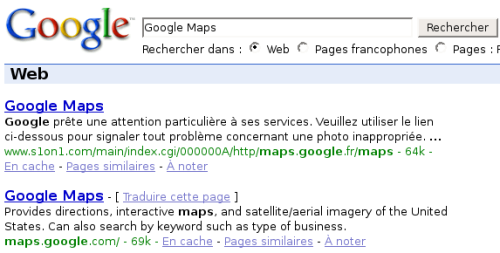1plusV is one of four companies, including Microsoft Corp, that have accused Google of abusing its dominant position by giving preference to its own services in search results at the expense of rival sites. The allegations have triggered an investigation by the European Commission.
Last week the Federal Trade Commission also opened a formal probe into Google's market practices, raising the specter of a protracted regulatory battle on both sides of the Atlantic for Google -- similar to Microsoft's earlier fights with the authorities.
1plusV, which runs the Ejustice.fr legal website and search engine, said Google prevented it from developing specialized "vertical" search engines and crippled its ability to generate business and advertising. The claim is for lost and future profits, it added.
The company filed the claim with the Paris Commercial Court on Tuesday.
"Between 2007 and 2010, no less than 30 vertical search engines created by 1plusV were blacklisted, some of which showed significant business potential," it said.
Google declined to comment in detail about the complaint, which it said it had just received.
"We always try to do what's best for our users," spokesman Al Verney said. "It's the key principle that drives our company, and we look forward to explaining this."
The damages claim could be just the first of a series, said Thomas Vinje, a partner at law firm Clifford Chance who led a coalition that won EU fines against Microsoft.
"I would not be surprised if it encourages others to do the same," he said. "In general, it is becoming easier to obtain damages in competition cases across Europe than in the past."
British price comparison site Foundem, one of the complainants against Google, was not immediately available. Microsoft, which also owns the fourth complainant, German price comparison site Ciao, declined to comment.
1plusV accused Google of suffocating rivals through its policy of tying its Adsense advertising service to its own search engine.
"If that company were to win, it will set a very negative precedent for Google," said BGC Partners analyst Colin Gillis. "If it becomes a trend where it's not just government penalties but lost profits from competitors, that adds up quick."
Google's Adsense allows advertisers to buy keywords that, when typed in as a search query, produce a commercial link alongside the search results. Thus rival search engines wanting to access vital clients and revenue were forced to adopt Google technology.
In the Microsoft case, the European Union executive, with the power to fine companies up to 10 percent of their global turnover for breaching EU rules, has hit the company with fines totaling more than 1 billion euros.
google france

google france

google france

google france

google france

google france

google france

google france

google france

google france

Visite chez Google France
Marissa Mayer @ Google France
No comments:
Post a Comment